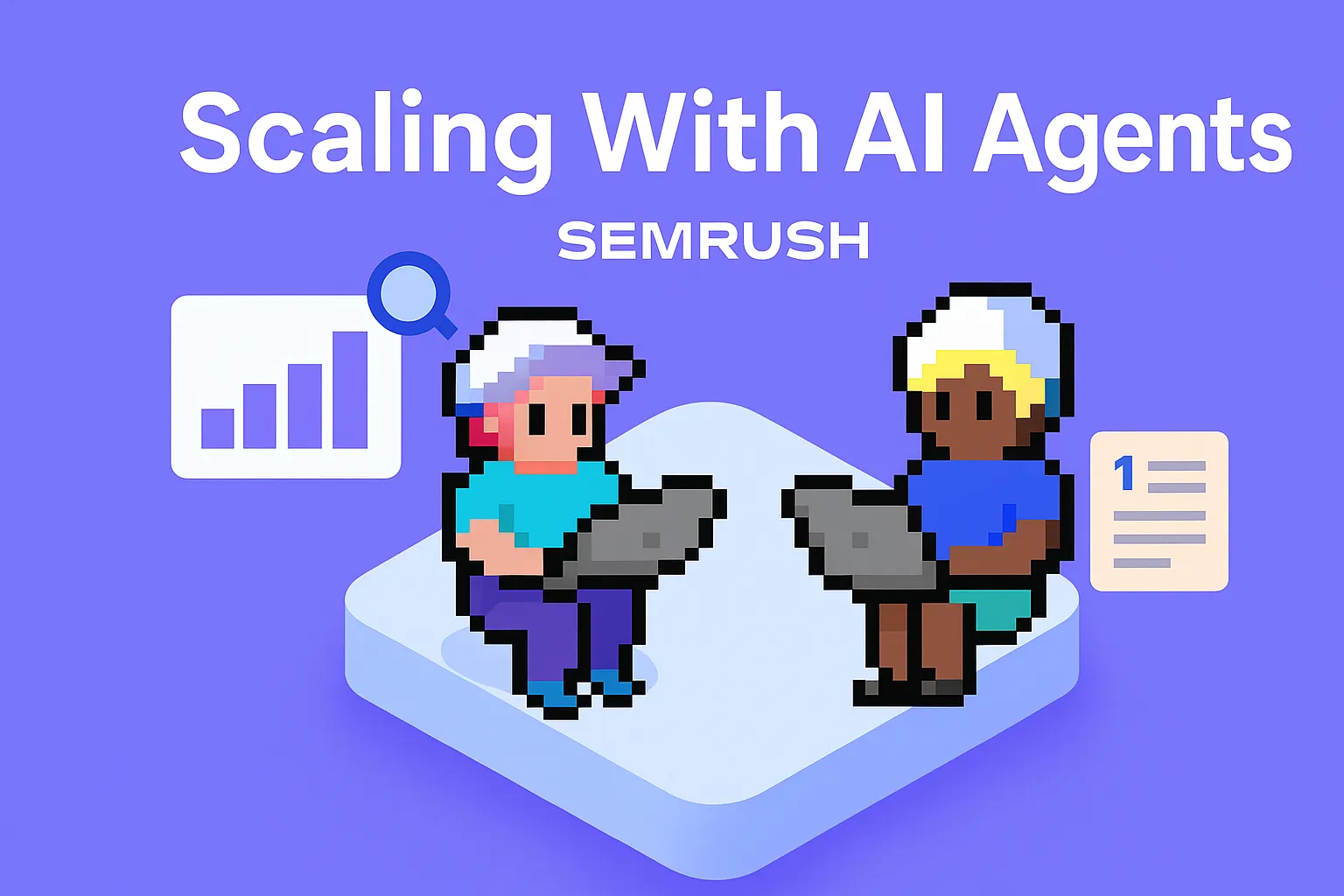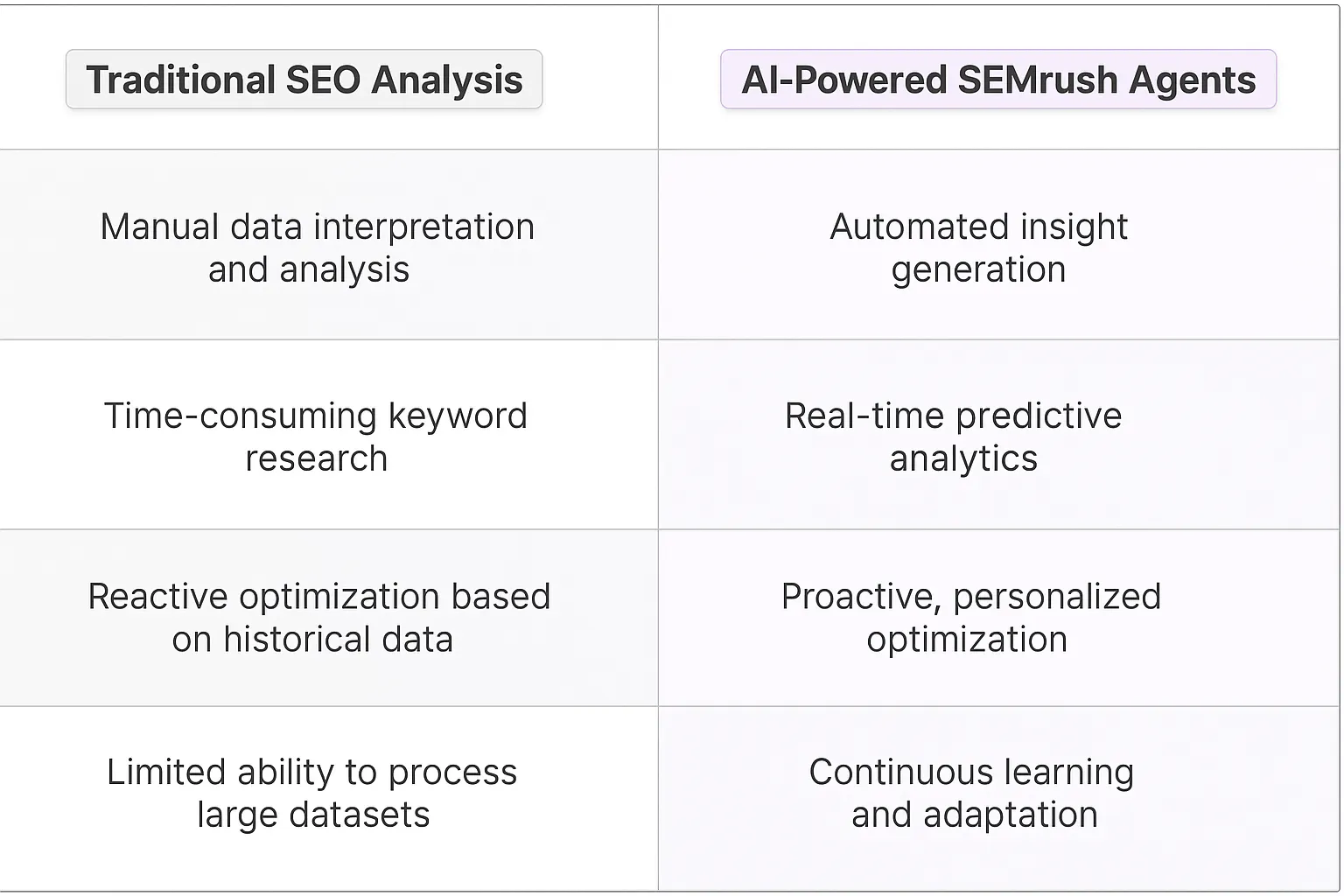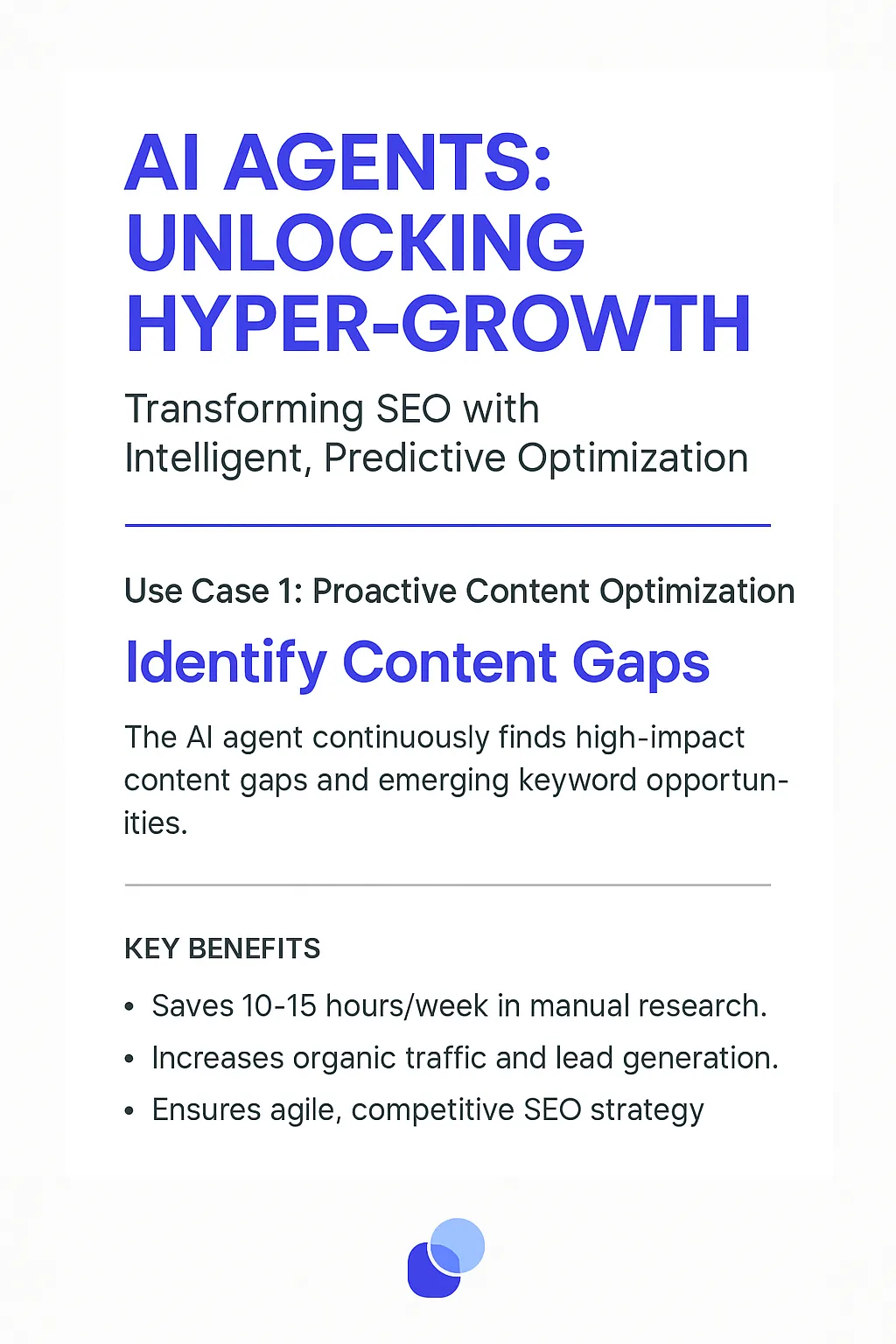SEMrush AI Agents
Understanding SEMrush
SEMrush is a comprehensive digital marketing suite that's become indispensable for SEO professionals, content marketers, and digital strategists. It's like a Swiss Army knife for online visibility, offering tools for keyword research, competitor analysis, site audits, and much more. But SEMrush isn't just a data provider; it's a platform that turns raw information into actionable insights.
SEMrush's arsenal includes powerful features that set it apart in the crowded MarTech landscape:1. Keyword Magic Tool: This isn't your average keyword finder. It's a goldmine of long-tail opportunities and semantic variations.2. Domain vs. Domain Analysis: It's like X-ray vision for your competitors' strategies, revealing their strengths and weaknesses.3. Position Tracking: Real-time ranking data that goes beyond just numbers, showing you the 'why' behind ranking fluctuations.4. Site Audit: It's not just about finding technical SEO issues; it's about prioritizing fixes for maximum impact.5. Content Marketing Platform: A full-suite tool that guides you from ideation to optimization, ensuring your content hits the mark every time.

Benefits of AI Agents for SEMrush
What would have been used before AI Agents?
Before AI agents entered the scene, SEMrush users were navigating a complex landscape of manual data analysis and interpretation. They'd spend hours poring over keyword rankings, backlink profiles, and competitor metrics, trying to piece together actionable insights. It was like trying to solve a thousand-piece puzzle while blindfolded – possible, but painfully slow and often inaccurate.
Marketing teams would rely on a combination of gut instinct, experience, and time-consuming data crunching to make strategic decisions. They'd export massive CSV files, create pivot tables in Excel, and pray they didn't miss a crucial data point that could make or break their SEO strategy. It was a world where the fastest analyst often won, but at the cost of deep, nuanced understanding.
What are the benefits of AI Agents?
Enter AI agents, and suddenly we're playing a whole new ball game. These digital teammates are like having a team of expert analysts working 24/7, but with superhuman speed and pattern recognition abilities. They're transforming how marketers interact with SEMrush data in several key ways:
- Rapid Insight Generation: AI agents can sift through mountains of SEO data in seconds, spotting trends and anomalies that would take humans days or weeks to uncover. They're not just faster; they're seeing connections we might never make on our own.
- Predictive Analytics: These agents don't just tell you what happened; they're constantly running scenarios to predict what's likely to happen next. It's like having a crystal ball for your SEO strategy, powered by cold, hard data.
- Personalized Recommendations: AI agents learn from your specific data and goals, tailoring their advice to your unique situation. It's not one-size-fits-all anymore; it's bespoke strategy at scale.
- Natural Language Interfaces: Forget complex query languages. With AI agents, you can ask questions in plain English and get clear, actionable answers. It's democratizing access to deep SEO insights across your entire organization.
- Continuous Learning: These agents are always improving, learning from new data and user interactions. The more you use them, the smarter and more valuable they become – it's compound interest for your marketing intelligence.
The real power of AI agents in SEMrush isn't just about doing things faster or easier. It's about unlocking entirely new capabilities and insights that were previously impossible. We're moving from a world of reactive SEO to proactive, predictive optimization. It's not just a step change; it's a paradigm shift in how we approach digital marketing strategy.
As these AI agents continue to evolve, we're going to see a new breed of marketers emerge – ones who can leverage these tools to operate at a strategic level we've never seen before. The winners in this new landscape won't be those with the biggest budgets or the most manpower, but those who can most effectively collaborate with and learn from their AI teammates.

Potential Use Cases of AI Agents with SEMrush
Processes
SEMrush, the Swiss Army knife of digital marketing, just got a whole lot sharper with AI agents in the mix. These digital teammates are redefining how marketers approach SEO, content strategy, and competitive analysis. Let's dive into some game-changing processes where AI agents are making waves:
- Keyword research Automation: AI agents can sift through SEMrush's vast keyword database, identifying golden opportunities that human marketers might overlook. They're not just pulling high-volume keywords; they're uncovering the long-tail gems that can drive targeted traffic.
- Competitor Backlink Analysis: Instead of manually combing through backlink profiles, AI agents can analyze competitors' link-building strategies, spotting patterns and untapped link opportunities. This process becomes an ongoing, real-time activity rather than a periodic task.
- Content Gap Analysis: AI agents can continuously monitor your content strategy against competitors, identifying topics you're missing out on and suggesting content ideas that align with your SEO goals.
- SERP Feature Optimization: With AI agents, you can automate the process of tracking and optimizing for SERP features. They can analyze which features your competitors are winning and provide actionable insights to capture those coveted spots.
Tasks
Now, let's break it down to the nitty-gritty tasks where AI agents are proving to be indispensable sidekicks in the SEMrush ecosystem:
- Daily Rank Tracking: AI agents can monitor your keyword rankings daily, alerting you to significant changes and providing context on why these shifts might be happening.
- Content Optimization: For each piece of content, AI agents can analyze SEMrush data to suggest on-page optimizations, from keyword placement to content structure, ensuring your content is primed for search engines.
- Competitive analysis Gathering: AI agents can keep tabs on your competitors' SEO activities, flagging new content, backlinks, or keyword strategies they're employing.
- Technical SEO Audits: Leveraging SEMrush's site audit tool, AI agents can perform regular technical SEO checks, prioritizing issues based on their impact and providing step-by-step fix recommendations.
- PPC Campaign Optimization: For those using SEMrush's PPC features, AI agents can analyze campaign performance, suggest bid adjustments, and identify new keyword opportunities to improve ROI.
The integration of AI agents with SEMrush isn't just about automation; it's about augmentation. These digital teammates are enhancing human capabilities, allowing marketers to operate at a higher level of strategy and creativity. They're not replacing the marketer's intuition and expertise; they're amplifying it.
As we see this symbiosis between AI agents and SEMrush unfold, we're witnessing a shift from tool-based marketing to intelligence-driven marketing. It's not just about having access to data anymore; it's about having an intelligent layer that can interpret that data, spot trends, and suggest actions in real-time.
The marketers who embrace this AI-augmented approach to SEMrush will find themselves with a significant competitive edge. They'll be able to move faster, adapt quicker, and execute with greater precision than ever before. Welcome to the era of AI-powered SEO – it's not the future, it's the now.

Industry Use Cases
AI agents in SEMrush are like having a team of digital marketing ninjas at your fingertips. They're not just tools; they're game-changers that can transform how businesses approach SEO and digital marketing. Let's dive into some real-world scenarios where these AI-powered allies shine:
E-commerce companies can leverage SEMrush AI agents to dissect competitor strategies, uncover hidden keyword opportunities, and optimize product descriptions at scale. For content publishers, these digital teammates act as tireless researchers, churning out topic ideas and identifying content gaps that human editors might miss. In the fiercely competitive SaaS landscape, SEMrush AI agents become strategic advisors, helping companies fine-tune their SEO playbooks and stay ahead of market trends.
But it's not just about the big players. Local businesses can tap into SEMrush AI to dominate geo-specific searches, while agencies can use these AI-powered tools to manage multiple client campaigns with unprecedented efficiency. The beauty of these AI agents lies in their ability to adapt and learn, constantly evolving to meet the unique challenges of each industry they touch.
E-commerce SEO Domination with SEMrush AI Agents
Let's talk about e-commerce. It's a brutal battlefield where visibility can make or break your business. Enter SEMrush AI Agents – your secret weapon in the SEO arms race.
These digital teammates aren't just glorified keyword counters. They're like having a team of SEO savants working 24/7 to propel your online store to the top of search results. Here's the kicker: they learn and adapt faster than any human analyst could dream of.
Picture an AI agent that doesn't just track your competitors but predicts their next move. It's constantly analyzing market trends, customer behavior, and search patterns to identify untapped opportunities. You're not just keeping up; you're staying three steps ahead.
But here's where it gets really interesting. These AI agents can personalize your SEO strategy for different product categories, seasons, and even individual customer segments. They're crafting meta descriptions that speak directly to your target audience's desires and pain points, boosting click-through rates like never before.
And let's not forget about content. These AI agents are content idea generators on steroids. They're not just spitting out generic blog post titles; they're identifying content gaps in your niche and suggesting topics that will drive qualified traffic to your store.
The real magic happens when you let these AI agents loose on your site structure and internal linking. They'll optimize your site architecture for both search engines and user experience, creating a seamless journey that guides visitors from landing pages to checkout.
In the e-commerce world, where margins are tight and competition is fierce, SEMrush AI Agents aren't just a nice-to-have. They're the difference between being a category leader and a forgotten also-ran. It's not about working harder; it's about leveraging AI to work smarter and faster than your competition ever thought possible.
Travel Industry SEO Transformation with SEMrush AI Agents
The travel industry is a complex ecosystem where search visibility can make or break a business. SEMrush AI Agents are reshaping how travel companies approach SEO, creating a new paradigm for digital marketing in this space.
These AI-powered digital teammates are not just analyzing keywords; they're decoding traveler intent at scale. They're parsing through millions of search queries, social media posts, and review sites to understand the evolving preferences and pain points of different traveler segments.
What's fascinating is how these AI agents can adapt to the cyclical nature of the travel industry. They're not just reacting to seasonal trends; they're anticipating them. By analyzing historical data and current market signals, they can predict when certain destinations will spike in popularity, allowing travel companies to adjust their SEO strategies proactively.
The real game-changer is in localization. These AI agents can tailor SEO strategies for different geographic markets, understanding the nuances of language and cultural preferences. They're not just translating content; they're localizing it, ensuring that a Japanese traveler searching for a beach vacation gets results that resonate with their specific cultural context and expectations.
Content creation in the travel industry is getting a major upgrade too. These AI agents are identifying gaps in travel content that humans might miss. They're suggesting topics that blend high search volume with low competition, helping travel sites create content that stands out in a crowded space.
Perhaps the most impactful application is in dynamic pricing SEO. These AI agents can optimize landing pages and meta descriptions in real-time based on pricing data and competitor offerings. This means that when a potential traveler searches for a flight or hotel, they're more likely to see an offer that's both competitive and profitable.
The implications for user experience are profound. These AI agents are optimizing site structures to create intuitive pathways from inspiration to booking. They're analyzing user behavior to understand where travelers drop off in the booking process and suggesting SEO tweaks to smooth out these friction points.
In an industry where margins are tight and competition is global, SEMrush AI Agents are giving travel companies an edge that was previously unimaginable. They're not just improving search rankings; they're fundamentally changing how travel companies understand and connect with their audience through search.
Considerations and Challenges in Implementing SEMrush AI Agents
Technical Challenges
Integrating SEMrush AI agents into your existing tech stack isn't a walk in the park. You're essentially introducing a new player to your team, one that speaks in APIs and data streams. First off, you'll need to ensure your current systems can handle the constant data exchange with these digital teammates. It's not just about plugging in a new tool; it's about creating a symbiotic relationship between your human workforce and these AI agents.
Data privacy and security become paramount concerns. SEMrush AI agents will be handling sensitive marketing data, competitor insights, and potentially customer information. You'll need robust encryption protocols and stringent access controls to keep this data fortress impenetrable. Remember, a chain is only as strong as its weakest link, and in this case, that link could be the integration point between your systems and the AI agent.
Operational Challenges
On the operational front, you're looking at a significant shift in how your marketing team functions. These AI agents aren't just tools; they're digital colleagues that will reshape workflows and decision-making processes. You'll need to invest time in training your team not just on how to use the AI, but how to collaborate with it effectively. It's like learning to dance with a partner who never gets tired and always knows the steps.
There's also the challenge of managing expectations. Some team members might view the AI as a threat to their jobs, while others might overestimate its capabilities. Striking the right balance is crucial. You want your team to leverage the AI's strengths without becoming overly dependent on it. After all, the goal is to augment human intelligence, not replace it.
Strategic Considerations
From a strategic standpoint, implementing SEMrush AI agents requires a long-term vision. You're not just adopting a tool; you're embarking on a digital transformation journey. This means rethinking your marketing strategies, redefining KPIs, and possibly restructuring your team. The AI will provide insights at a scale and speed previously unimaginable, but translating these insights into actionable strategies still requires human creativity and intuition.
Moreover, you'll need to consider the ethical implications of using AI in your marketing efforts. As these digital teammates become more sophisticated, questions about transparency, bias, and accountability will inevitably arise. Staying ahead of these issues and establishing clear guidelines for AI use will be crucial for maintaining trust with your customers and stakeholders.
Financial Implications
Let's talk money. Implementing SEMrush AI agents isn't just a one-time cost. You're looking at ongoing expenses for licensing, maintenance, and potentially, customization. There's also the hidden cost of the learning curve – productivity might take a hit initially as your team adapts to working with their new digital colleagues. However, if leveraged correctly, these AI agents could significantly boost your ROI in the long run by optimizing your marketing efforts and uncovering opportunities you might have missed.
The key is to approach this as an investment rather than an expense. You're not just buying a tool; you're investing in a new capability that could potentially reshape your entire marketing approach. But like any investment, it requires careful planning, monitoring, and adjustment to ensure you're getting the best possible returns.
Embracing the AI-Powered Marketing Revolution
The integration of AI agents into SEMrush isn't just an upgrade; it's a paradigm shift. We're moving from a world where marketers were data interpreters to one where they're strategic orchestrators, leveraging AI to uncover insights and opportunities at superhuman speed and scale. This isn't about replacing human creativity; it's about amplifying it. The marketers who thrive in this new landscape will be those who can effectively collaborate with their AI teammates, combining machine precision with human intuition. As we stand on the brink of this AI-powered marketing revolution, one thing is clear: the future belongs to those who can harness the power of SEMrush's AI agents to not just keep up with the digital marketing race, but to redefine it entirely.













